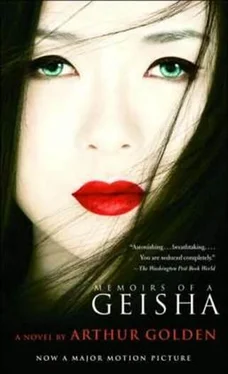“Yoroido?” he said. “You can’t mean it.”
I long ago developed a very practiced smile, which I call my “Noh smile” because it resembles a Noh mask whose features are frozen. Its advantage is that men can interpret it however they want; you can imagine how often I’ve relied on it. I decided I’d better use it just then, and of course it worked. He let out all his breath and tossed down the cup of sake I’d poured for him before giving an enormous laugh I’m sure was prompted more by relief than anything else.
“The very idea!” he said, with another big laugh. “You, growing up in a dump like Yoroido. That’s like making tea in a bucket!” And when he’d laughed again, he said to me, “That’s why you’re so much fun, Sayuri-san. Sometimes you almost make me believe your little jokes are real.”
I don’t much like thinking of myself as a cup of tea made in a bucket, but I suppose in a way it must be true. After all, I did grow up in Yoroido, and no one would suggest it’s a glamorous spot. Hardly anyone ever visits it. As for the people who live there, they never have occasion to leave. You’re probably wondering how I came to leave it myself. That’s where my story begins.
* * *
In our little fishing village of Yoroido, I lived in what I called a “tipsy house.” It stood near a cliff where the wind off the ocean was always blowing. As a child it seemed to me as if the ocean had caught a terrible cold, because it was always wheezing and there would be spells when it let out a huge sneeze-which is to say there was a burst of wind with a tremendous spray. I decided our tiny house must have been offended by the ocean sneezing in its face from time to time, and took to leaning back because it wanted to get out of the way. Probably it would have collapsed if my father hadn’t cut a timber from a wrecked fishing boat to prop up the eaves, which made the house look like a tipsy old man leaning on his crutch.
Inside this tipsy house I lived something of a lopsided life. Because from my earliest years I was very much like my mother, and hardly at all like my father or older sister. My mother said it was because we were made just the same, she and I-and it was true we both had the same peculiar eyes of a sort you almost never see in Japan. Instead of being dark brown like everyone else’s, my mother’s eyes were a translucent gray, and mine are just the same. When I was very young, I told my mother I thought someone had poked a hole in her eyes and all the ink had drained out, which she thought very funny. The fortune-tellers said her eyes were so pale because of too much water in her personality, so much that the other four elements were hardly present at all-and this, they explained, was why her features matched so poorly. People in the village often said she ought to have been extremely attractive, because her parents had been. Well, a peach has a lovely taste and so does a mushroom, but you can’t put the two together; this was the terrible trick nature had played on her. She had her mother’s pouty mouth but her father’s angular jaw, which gave the impression of a delicate picture with much too heavy a frame. And her lovely gray eyes were surrounded by thick lashes that must have been striking on her father, but in her case only made her look startled.
My mother always said she’d married my father because she had too much water in her personality and he had too much wood in his. People who knew my father understood right away what she was talking about. Water flows from place to place quickly and always finds a crack to spill through. Wood, on the other hand, holds fast to the earth. In my father’s case this was a good thing, for he was a fisherman, and a man with wood in his personality is at ease on the sea. In fact, my father was more at ease on the sea than anywhere else, and never left it far behind him. He smelled like the sea even after he had bathed. When he wasn’t fishing, he sat on the floor in our dark front room mending a fishing net. And if a fishing net had been a sleeping creature, he wouldn’t even have awakened it, at the speed he worked. He did everything this slowly. Even when he summoned a look of concentration, you could run outside and drain the bath in the time it took him to rearrange his features. His face was very heavily creased, and into each crease he had tucked some worry or other, so that it wasn’t really his own face any longer, but more like a tree that had nests of birds in all the branches. He had to struggle constantly to manage it and always looked worn out from the effort.
When I was six or seven, I learned something about my father I’d never known. One day I asked him, “Daddy, why are you so old?” He hoisted up his eyebrows at this, so that they formed little sagging umbrellas over his eyes. And he let out a long breath, and shook his head and said, “I don’t know.” When I turned to my mother, she gave me a look meaning she would answer the question for me another time. The following day without saying a word, she walked me down the hill toward the village and turned at a path into a graveyard in the woods. She led me to three graves in the corner, with three white marker posts much taller than I was. They had stern-looking black characters written top to bottom on them, but I hadn’t attended the school in our little village long enough to know where one ended and the next began. My mother pointed to them and said, “Natsu, wife of Sakamoto Minoru.” Sakamoto Minoru was the name of my father. “Died age twenty-four, in the nineteenth year of Meiji.” Then she pointed to the next one: “Jinichiro, son of Sakamoto Minoru, died age six, in the nineteenth year of Meiji,” and to the next one, which was identical except for the name, Masao, and the age, which was three. It took me a while to understand that my father had been married before, a long time ago, and that his whole family had died. I went back to those graves not long afterward and found as I stood there that sadness was a very heavy thing. My body weighed twice what it had only a moment earlier, as if those graves were pulling me down toward them.
* * *
With all this water and all this wood, the two of them ought to have made a good balance and produced children with the proper arrangement of elements. I’m sure it was a surprise to them that they ended up with one of each. For it wasn’t just that I resembled my mother and had even inherited her unusual eyes; my sister, Satsu, was as much like my father as anyone could be. Satsu was six years older than me, and of course, being older, she could do things I couldn’t do. But Satsu had a remarkable quality of doing everything in a way that seemed like a complete accident. For example, if you asked her to pour a bowl of soup from a pot on the stove, she would get the job done, but in a way that looked like she’d spilled it into the bowl just by luck. One time she even cut herself with a fish, and I don’t mean with a knife she was using to clean a fish. She was carrying a fish wrapped in paper up the hill from the village when it slid out and fell against her leg in such a way as to cut her with one of its fins.
Our parents might have had other children besides Satsu and me, particularly since my father hoped for a boy to fish with him. But when I was seven my mother grew terribly ill with what was probably bone cancer, though at the time I had no idea what was wrong. Her only escape from discomfort was to sleep, which she began to do the way a cat does-which is to say, more or less constantly. As the months passed she slept most of the time, and soon began to groan whenever she was awake. I knew something in her was changing quickly, but because of so much water in her personality, this didn’t seem worrisome to me. Sometimes she grew thin in a matter of months but grew strong again just as quickly. But by the time I was nine, the bones in her face had begun to protrude, and she never gained weight again afterward. I didn’t realize the water was draining out of her because of her illness. Just as seaweed is naturally soggy, you see, but turns brittle as it dries, my mother was giving up more and more of her essence.
Читать дальше












